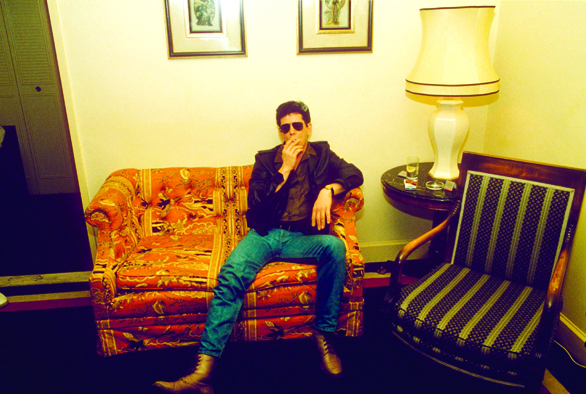 Lewis Allen Reed took rock and roll to the darkest corners of feeling; he rinsed it in the tears and sweat of his memories and dressed it with scars and kisses to deliver it to us as another expression of his music. Reed embellished us with pain and bewilderment, with memorable phrases and simple chords, basic, but honest and full of truth.
Lewis Allen Reed took rock and roll to the darkest corners of feeling; he rinsed it in the tears and sweat of his memories and dressed it with scars and kisses to deliver it to us as another expression of his music. Reed embellished us with pain and bewilderment, with memorable phrases and simple chords, basic, but honest and full of truth.
Reed had expressed that his objective had always been to bring the sensibility of a novel to rock and roll, something along the lines of writing the Great American novel as an album. As a composer, he spoke of prostitution and transsexuality, subjects that rock music didn’t used to address. He sang of a New York far from what Frank Sinatra crooned about. Lou’s work was marked by both sensibility and crudeness, songs which defined a unique model in music writing. Patti Smith was the first one to say it, “Lou Reed brought culture to rock and roll; we owe this fucker so much!”
In 1964, Reed created the band The Velvet Underground along with John Cale, Sterling Morrison and Maureen Tucker. Despite being sponsored by the influential artist Andy Warhol, the band never had any significant commercial success. Nonetheless, it is considered one of the most successful bands of the underground movement. Brian Eno described it as this: “From their first album, they barely sold thirty thousand copies; but I assure you that from each buyer, a new band was born; they were the trailblazers of the ‘underground’ movement.”
 Throughout his career, Reed kept releasing solo albums that were just as good and unmarketable, genuine jewels such as “Transformer” (a glam-rock album produced by David Bowie) and “Berlin” (a chaotic and violent album that many pronounce was the precursor of punk’s lyricism in the mid seventies). More than twenty albums which in most of cases, demands effort from the listener in order to decipher and digest them. Lou used to say, “My best lines are in my album “Magic and Loss” where I talk of magic and the magicians I met In Mexico. I was always obsessed with disappearing by a magic act; disappear and reappear as a new man.”
Throughout his career, Reed kept releasing solo albums that were just as good and unmarketable, genuine jewels such as “Transformer” (a glam-rock album produced by David Bowie) and “Berlin” (a chaotic and violent album that many pronounce was the precursor of punk’s lyricism in the mid seventies). More than twenty albums which in most of cases, demands effort from the listener in order to decipher and digest them. Lou used to say, “My best lines are in my album “Magic and Loss” where I talk of magic and the magicians I met In Mexico. I was always obsessed with disappearing by a magic act; disappear and reappear as a new man.”
In May of this year, Reed underwent a liver transplant surgery, which he adeptly had destroyed during five decades of alcohol and drug abuse. Upon leaving the operating room he expressed, “Look at me, I am a triumph of modern medicine, physics and chemistry. I am now bigger and stronger than ever.”
 It was on Sunday morning when he surely decided it was the perfect moment to go. Singer Laurie Anderson, Reed’s last romantic partner, expressed that he departed while doing Tai Chi movements with his hands. He had adopted this discipline upon meeting the singer and according to Anderson, it had filled him with peace and tranquility his last few months. Perhaps Lou died later than he ever imagined, when he was young. Perhaps in his death he suffered far less than when he underwent therapy to correct his homosexual tendencies as a little boy. Surely he knew that his record sales would increase a whopping 300% in the first week after his death, a very distant figure from what he ever accomplished with his first single with The Shades, his first band.
It was on Sunday morning when he surely decided it was the perfect moment to go. Singer Laurie Anderson, Reed’s last romantic partner, expressed that he departed while doing Tai Chi movements with his hands. He had adopted this discipline upon meeting the singer and according to Anderson, it had filled him with peace and tranquility his last few months. Perhaps Lou died later than he ever imagined, when he was young. Perhaps in his death he suffered far less than when he underwent therapy to correct his homosexual tendencies as a little boy. Surely he knew that his record sales would increase a whopping 300% in the first week after his death, a very distant figure from what he ever accomplished with his first single with The Shades, his first band.
Lou Reed’s death is grieved as you grieve the death of one of the last true examples of a species. Just like his work says more than he ever sang, perhaps with his death he says something more, that he really, finally disappeared, that he was granted his last great magic act, that he finally is a new man.
Rest in peace.
Lou Reed
March 2, 1942 – October 27, 2013

